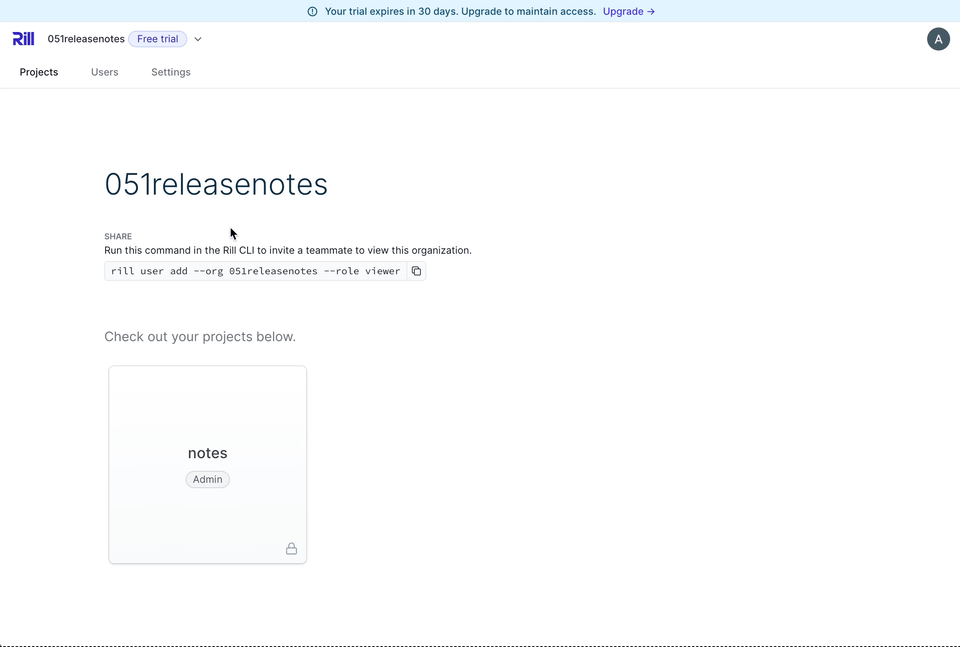Rill 0.51 - Billing in the Cloud, User Management and sending reports to external users!
⚡ Rill Developer is a tool that makes it effortless to transform your datasets with SQL and create fast, exploratory dashboards. Rill Cloud can then help to enable shared collaboration at scale.
To try out Rill Developer, check out these instructions and join us over on Discord to meet the team behind the product as well as other users. In addition, once you have a project set up in Rill Developer, you can then deploy the project and collaborate with others / invite your team members by logging into Rill Cloud!

Billing and Self Serve
You can now manage your own billing of Rill directly from Rill Cloud. From signing up, switching tiers and checking quotas all without ever having to leave your browser. It just got even easier to get started with Rill!
Sending reports to external users
With our 0.51 release you can now send reports to external non-users of Rill. If a non-user receives a report it will be locked down and secure so that you rest easy that they only have access to the data that you intended for.
Managing Users in Rill Cloud
Managing your users just got easier! You can now add and remove users directly from within Rill Cloud without using the CLI.
Bug Fixes and Misc
- Upgrade to DuckDB v1.1.3.
- Changes to defining variables from
.var.*to.env.*. - Refactored
splitstopartitions. - Support for unnesting dimensions for ClickHouse metrics view.
model:vs.table:when generating metrics view based on the underlying model / table.- local files in a ClickHouse project to write the file into a Clickhouse table on deployment.
- improved UI: Nit touch up to Rill Developer's Add UI.
- improved UI: Nit touch up to Rill Developer's Go to metrics view.
- improved UI: New icon for metrics view and connectors.
- improved UI: Added photo to User Management in Rill Cloud.
- improved UI: Longer tooltip descriptions.
- improved UI: Use Explore dashboard's title for the web page title.
- improved UI: null values in TDD as italics, same as explore view.
- improved UX: Added ability to duplicate file in Rill Developer.
- improved UX: Added ability to refresh all sources and models in Rill Cloud Status page.
- improved UX: Errors displayed in Pivot view, instead of loading screen.
- improved UX: when generating metrics views, set
format_presettohumanize. - improved UX: during deployment, can see more available organizations (from 20).
- improved UX: estimate the column width in pivot view based on data value and label.
- improved UX: creating explore dashboard using UI navigates to the dashboard instead of YAML.
- improved UX: Health check to include dahsboard query, fixes issue where dashboards are healthy but no data is returned.
- improved UX:
smallest_time_grainalso applied to pivot view. - improved UX: Added a
databasespecification when defining connector such as ClickHouse to explicitly define a database to connect to. - improved UX: Depending on your role (organization and project), improved the UI for sharing a project in Rill Cloud.
- improved UX: disable preview button when explore dashboard is still reconciling.
- improved UX: Adds ability to hide the pivot view from embed explore dashboards.
- fixed issue with files in the
dashboardsfolder, inferring resource type and existing deprecated dashboards. - fixed issue where generated metrics view's measure name colliding with column names.
- fixed issue with defaults not available in explore dashboards.
- fixed issue with security policy test,
View asnot available on Explore dashboards. - fixed issue with file name constraints between explore and metrics view.
- fixed issue with auto generated explore dashboards not using metrics view.
- fixed OLAP connector form.
- fixed issue with status not being reported if the
ProjectParserresource had a reconcile error. - fixed general issues around model/source handling.
- fixed issue where metrics view did not populate dimensions when connector was explicitly defined (IE: ClickHouse).
- fixed issue where sources not updated when local file is updated, now re-ingests even when changes are made locally.
- fixed issue with new bookmarks not containing any view.
- fixed issue where
<and>were opposite in filtering. - fixed issue with metrics view name being used in pivot table rather than explore dashboard name.